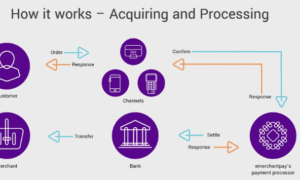The credit card processing industry is a high-growth sector that offers a scalable business model with recurring revenue. As digital transactions dominate, businesses need reliable and cost-effective payment solutions, creating a strong demand for merchant service providers.
Starting a credit card processing business allows you to help companies save money on payment processing while generating long-term residual income. However, the industry can be complex, requiring the proper knowledge, partnerships, and business strategies to be successful. Programs like Cash Swipe provide structured guidance to help entrepreneurs navigate this space effectively.
For a broader understanding of how credit card processing works, you can refer to Wikipedia’s article on payment processing.
Why Consider a Credit Card Processing Business?
Unlike many other business models, credit card processing offers recurring revenue. Once a business signs up for your payment services, you earn a percentage of every transaction they process. Here are some key advantages:
- Consistent Demand – Nearly every business that accepts credit or debit cards requires a payment processor.
- Residual Income – Your earnings continue as long as your merchants process transactions.
- Low Overhead Costs – No need for inventory, expensive equipment, or a physical office.
- Scalability – You can grow your business by signing more merchants or hiring a sales team.
- Flexible Work Model – Operate remotely and set your own schedule.
How to Start Your Own Credit Card Processing Business: Steps to Follow
1. Understand How the Industry Works
Before diving in, it’s essential to understand the fundamentals of payment processing, including:
- How credit and debit transactions are handled, focusing on credit card payments. This includes the technical and regulatory aspects, such as how consumers initiate transactions and process through various financial entities, including payment gateways and banks. Adherence to industry standards and certification is crucial for successful operation.
- Different types of processing fees (interchange, assessment, and markup fees)
- Merchant contracts and pricing structures
- Compliance requirements and industry regulations
- The role of a credit card processor as an intermediary between customers and merchants. This includes the necessary certifications and the growing demand for reliable payment solutions in the digital market.
A solid foundation allows you to offer better solutions to businesses and stand out from competitors.
2. Market Research and Business Planning
Before entering the credit card processing business, conducting thorough market research and crafting a solid business plan are crucial. Start by identifying your target audience, understanding their needs, and analyzing their preferences. This will help you tailor your services to meet market demands effectively.
Next, examine your competitors closely. Identify what they are doing well and where there might be gaps in the market that your credit card processing company can fill. This competitive analysis will inform your unique selling proposition (USP) and value proposition, setting you apart from other payment processors.
Your business plan should clearly outline your company’s mission, goals, and strategies for achieving them. Develop a comprehensive marketing strategy that leverages social media, content marketing, and paid advertising to reach potential clients. Establishing partnerships with financial institutions and other payment processors is also essential to facilitate seamless credit card processing.
Finally, create a pricing strategy that considers all relevant costs, including payment processing and transaction fees. This will ensure that your services are competitively priced while allowing for profitability.
2. Choose the Right Payment Processing Partner
Next, examine your competitors closely. Analyze their strengths and weaknesses and identify any gaps in the market that you can fill. Payment processing companies are crucial in facilitating various forms of digital transactions, not just credit card processing. They offer significant revenue potential through transaction fees and value-added services. Understanding these aspects can help you position your business more effectively.
Your business plan should clearly outline your target market, competitive landscape, and marketing strategy. Additionally, it should define key features within a credit card processing system, such as security, fraud detection, multi-currency support, and seamless integration with e-commerce platforms. This ensures merchants and consumers have a reliable and secure payment experience.
You’ll need to partner with a merchant services provider or an Independent Sales Organization (ISO) to offer credit card processing services. Choosing the right partner is crucial as it affects the rates you can offer businesses, the technology you provide, and the level of customer support available.
When selecting a provider, consider the following:
- Competitive rates for merchants
- Transparent pricing models with no hidden fees
- Reliable payment technology (POS systems, online gateways, etc.)
- Strong customer service and technical support
Working with a reputable payment processor ensures that your merchants receive a seamless payment experience, helping you retain long-term clients.
4. Technology and Infrastructure
The backbone of any successful credit card processing company is its technology and infrastructure. Start by developing a secure payment processing system that complies with industry standards, such as PCI DSS. This ensures that all transactions are protected, providing peace of mind to your clients.
Implement a versatile payment gateway capable of handling multiple payment methods, including credit and debit cards. This flexibility will make it easier for merchants to accept customer payments. Invest in a robust infrastructure that can handle high transaction volumes without compromising performance.
A user-friendly interface is also crucial. Merchants should easily manage their accounts and transactions through your system. A comprehensive tracking and reporting system should also be implemented to monitor payment processing and transaction fees. Ensure your system is scalable to accommodate growth and increased traffic, allowing your business to expand seamlessly.
3. Find and Sign Up Business Clients
Acquiring merchants is the key to growing your credit card processing business. Some practical ways to find potential clients include the following:
- Networking with local businesses – Many small businesses seek better processing rates.
- Cold outreach and direct sales – Calling or visiting businesses to offer competitive solutions.
- Digital marketing – Using social media, email marketing, and online ads to generate leads.
- Referrals from existing clients – Happy clients can recommend your services to other business owners.
A secure and efficient system is crucial for businesses accepting customer payments. It ensures smooth cash flow management and reduces fraud.
Explaining how your services can save businesses money or improve payment processing will be essential in closing deals. Credit card processing companies generate revenue through transaction fees and other charges, which is important to communicate to potential clients.
6. Launching the Business
Launching your credit card processing business requires meticulous planning and execution. Start by developing a detailed launch plan that includes marketing, sales, and customer support strategies. Establish strong partnerships with financial institutions and payment processors to ensure a smooth payment process for your clients.
Train your staff thoroughly on the payment processing system and customer support procedures. This will ensure they can provide top-notch service to your clients from day one. Launch your website and marketing campaigns to attract potential clients, offering competitive pricing and promotions to entice them to choose your services.
Monitor transaction data closely to identify any areas for improvement. Continuously evaluate and enhance your payment processing system and customer support procedures to ensure your business remains competitive and efficient. Following these steps, you can launch and grow your credit card processing business, providing secure payment processing solutions to various merchants.
4. Build Long-Term Residual Income
Once a merchant starts processing payments through your services, you earn a portion of their transactions. Credit card processors are crucial in enabling these transactions between merchants and customers. As you grow your merchant base, your residual income increases without additional work.
To scale even further, some entrepreneurs choose to:
- Hire a sales team to acquire more clients.
- Offer additional services like point-of-sale systems, gift card programs, and fraud protection. A payment processing company can also provide diverse services, emphasizing the growing need for modern digital payment solutions.
- Work with larger businesses that process higher transaction volumes.
With the right strategy, your processing business can become a highly profitable and sustainable source of income.
Resources for Getting Started
Breaking into the payment processing industry can be challenging without proper guidance. Programs like Cash Swipe are one of the few online resources that provide a step-by-step roadmap for launching and growing a credit card processing business. Understanding the different types of payment processing services available, such as payment service providers and gateways, and the importance of associated fees and registration processes is crucial for businesses involved in the payment processing industry.
For those serious about starting in the credit card processing industry, a clear roadmap and expert guidance can significantly increase their success.
Final Thoughts
The credit card processing industry offers a lucrative opportunity for entrepreneurs willing to learn the business and put in the effort. You can build a scalable and profitable business with the proper knowledge, strategic partnerships, and sales approach.
Credit card processing is a high-potential industry worth exploring for those looking to build a long-term business with recurring income.



































